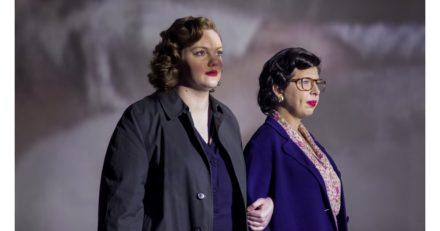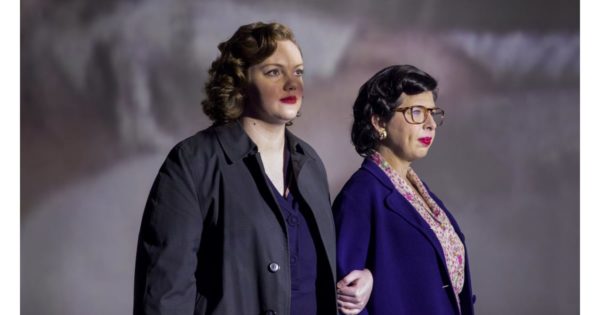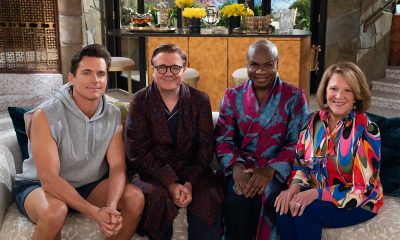Arts & Entertainment
For Heather Matarazzo, ‘Equal’ is still a cause worth fighting for


The HBO Max docuseries, “Equal,” which debuts this week, is designed to shore up our education by profiling various pioneers in a movement for LGBTQ equality that might never have happened if not for their refusal to stay invisible. It’s “infotainment” in the best sense of that term, blending real-life archival footage with newly filmed “re-enactments” to deliver a concise overview of pre-Stonewall history.
That means in addition to giving us a queer history lesson, “Equal” also gives us a host of queer actors paying homage to their forebears by standing in for them in the newly filmed sequences. There’s a long list: Cheyenne Jackson and Anthony Rapp (Dale Jennings and Harry Hay), Jamie Clayton (Christine Jorgensen), Samira Wiley (Lorraine Hansberry), and Hailie Sahar of “Pose” (Sylvia Rivera) are some of the better known – but among these familiar faces is also someone who is something of an icon in her own right.
Heather Matarazzo’s breakthrough performance at 13 as middle school outcast Dawn Weiner in Todd Solondz’s 1995 counter-culture classic, “Welcome to the Dollhouse,” made her a touchstone for a whole generation of traumatized teenagers. Later, she won a new flock of fans as BFF Lilly in “The Princess Diaries” movies, as well.
Now, she is appearing in “Equal” as Phyllis Lyon – who with partner Del Martin (played by Shannon Purser) co-founded the Daughters of Bilitis in 1955. The pair went on to become the first LGBTQ couple married in San Francisco in 2008.
Playing Lyon seems a natural fit for Matarazzo, given her own history as a vocal advocate for feminist and LGBTQ social justice issues, which were still very much on her mind as she spoke with the Blade last week about her participation in “Equal.”
Our conversation is below.
BLADE: How did you feel about playing Phyllis? Was there a sense of personal connection?
HEATHER MATARAZZO: It’s such an interesting question, right? Because history is history is history and so on, and so it goes. I got to feel safe enough to come out thanks to those who came before me, and put their bodies and their reputations on the line, in order for me to say, “Yes, I’m a lesbian,” and be able to say that publicly. I mean, really, I came out because I clearly didn’t have any other choice. It was so spontaneous, and it was so honest, and it was in the moment – and yet, within that, I get to look at those that came before me, in one way or another, and I get to see how their bravery allows me to be brave, too.
BLADE: And now you get to be that for others.
MATARAZZO: I do my best to receive any praise that I’m given, especially by those who say that my coming out helped enable them to come out – especially people that are younger than me, that knew me from “Princess Diaries” and whatnot, and then were like, “Oh my god, Lilly’s a LESBIAN?” I receive it as best as I can, because at the end of the day – and I say this in the most grounded of ways – we really, truly are all lights for each other.
BLADE: Like links in a chain.
MATARAZZO: Yeah, exactly. It’s a collective.
BLADE: What was your takeaway from playing Phyllis?
MATARAZZO: I think both she and Del were wonderful women who really stuck their necks out in order to build a safe community of lesbians. I was just talking about this with my wife the other night, about pre-Stonewall, and the risks that were continually taken in order for us, as members of the LGBTQ community, to be able to organize and meet with each other, in order to have a semblance of “normalcy.”
That’s what I love about Phyllis and Del, their ability, seemingly, to exhibit defiant joy. There’s a lot of joy that I see in their interviews together, about their story, how they met, the sneaking around… it almost becomes like a “Great Muppet Caper.” You know? Where it’s “We’re gonna do whatever it is we have to do to get to wherever it is we desire to be.” And I’m grateful that they both got to have that full experience before they passed, unlike so many that didn’t get it, or haven’t gotten it yet.
BLADE: Do you think it’s important to tell their stories for a generation that maybe doesn’t have it as hard?
MATARAZZO: The older I’ve gotten, on one hand it doesn’t seem like being out is that big of a deal anymore – and yet, even as I say that, we are looking at the fucking clown show that is this Supreme Court nomination process.
Let’s be clear, the United States is abysmal in its human rights practices. That’s not something that went away when we got marriage equality. I mean, look at all of the Black trans women that have been murdered here, this year alone? And I don’t think that we can talk about sexual orientation without also talking about race, without also talking about gender – there are so many different intersections, because when you talk about one, you can’t NOT talk about the other.
We all desire to be seen, and held, in our humanity. And we shouldn’t have to spend so much time fighting for our humanity and our fucking right to exist. Every single person deserves to feel safe, and not fear for their lives simply based upon one’s sexual orientation, or the color of one’s skin, or one’s religion, or one’s gender identity, or one’s – there are so many things. So, for me, it’s all so connected, it’s a microcosmic experience of something much larger.
BLADE: That ties in with your first-hand experience with sexism in Hollywood. You spoke up in support of Rose Byrne when she helped bring #MeToo and the Harvey Weinstein scandal into the spotlight. What would you say about that subject now?
MATARAZZO: I’m glad Weinstein’s in jail. I hope he stays there, and I hope he rots.
Here’s the thing, we still have a long way to go. Because again, MeToo was pretty much cis-gender, hetero white ladies speaking out about it, and so, you know, it’s synonymous now with cis-gender, hetero fucking white ladies – when the movement was founded by fucking Tarana Burke. And when you have 63 percent of white women voting for a fucking person who literally said, “I grab women by their pussies?” I mean, I think that white women just need to shut the fuck up, and finally listen to black women, for once.
Right now, the truth is that we are living in precarious times – we always have been, to one degree or another, depending on where you are in the disparity that is this American caste system.
BLADE: Do you hope that the current resurgence of the equality movement will help bring about change in those who oppose it?
MATARAZZO: Sure. Or, we could just leave them by the wayside.
Theater
‘Bad Books’ a timely look at censorship in local library
Influencer vs. conservative parent in Round House production

‘Bad Books’
Through May 4
Round House Theatre
4545 East-West Highway
Bethesda, Md.
Tickets start at $43
Roundhousetheatre.org
While a library might seem an unlikely place for a heated contretemps, it’s exactly the spot where adults go when they’re itching to battle out what books minors might be allowed to read.
In Sharyn Rothstein’s “Bad Books,” two women, The Mother (out actor Holly Twyford) and The Librarian (Kate Eastwood Norris), swiftly become mired in a quarrel that comes with some weighty repercussions.
The Mother is a popular conservative influencer on a mission. She’s furious that the local library has overstepped its bounds and she blames The Librarian, a woman who adheres to the “it takes a village” method of child rearing and is dedicated to the young people who approach her reference desk.
There’s some background. It seems The Librarian who dresses young (tight jackets and Doc Martens) and curses a blue streak, forged a friendship with Jeremy, a teenage library regular.
While the details are a bit hazy, it seems the troubled Jeremy confided in The Librarian regarding some personal issues. In return, she suggested a helpful book – Boob Juice.
Unsurprisingly, based solely on its title, the book has thrown The Mother into a pique of outrage. After finding Boob Juice in her son’s bedroom, she made a beeline to the library; and not incidentally, The Mother hasn’t read the recommended work and has no plans to do so.
Set in a suburb with lax gun laws, the story explores facets of division and conciliation. The Mother insists she isn’t so much about banning books as she is keeping some books away from young people until they’ve obtained parental approval.
“Bad Books” is performed in the round. Built on a rotating stage, Meghan Raham’s set is simple, pleasingly serviceable, and easily transforms from the library into a small corporate office, and later the assembly room of a church. Overhead floats a circular glass shelf filled with a cache of banned books. Things like a rolling book cart and a goldfish bowl add some flavor to the different locations.
The Mother wasn’t always a popular conservative warrior with an enthusiastic horde of followers.
Her past includes penning a book that later filled her with guilt and regret. She refers to that early questionable literary accomplishment as her bad book. And while over the years, she has persevered to find and destroy each and every printed copy, she hasn’t entirely succeeded.
Norris plays three women who figure meaningfully into the arc of Twyford’s mother character. In addition to The Librarian, Norris is The Manager, a broadly played piece of comic relief, and The Editor, a warm woman who reveals things about Jeremy that his own mother never knew.
Smartly staged by Ryan Rilette, the production is part of a National New Play Network Rolling World Premiere. While Rothstein’s script offers two strong roles (skillfully performed by celebrated actors Twyford and Norris), its ending feels too neatly resolved.
In the past, Twyford and Norris have successfully joined forces for numerous DMV productions including Studio Theatre’s production of David Auburn’s two-hander “Summer, 1976,” the story of a longtime and unlikely friendship between two women who meet as young mothers during the Bicentennial summer.
Though different, both The Librarian and The Mother share a strong and ultimately hopeful relationship with words.
There’s a quote from E.B. White’s classic “Charlotte’s Web” that pops up a couple of times in the briskly paced 80-minute play. Charlotte, the wise spider, says, “with just the right words you can change the world.”
Books
‘Pronoun Trouble’ reminds us that punctuation matters
‘They’ has been a shape-shifter for more than 700 years

‘Pronoun Trouble’
By John McWhorter
c.2025, Avery
$28/240 pages
Punctuation matters.
It’s tempting to skip a period at the end of a sentence Tempting to overuse exclamation points!!! very tempting to MeSs with capital letters. Dont use apostrophes. Ask a question and ignore the proper punctuation commas or question marks because seriously who cares. So guess what? Someone does, punctuation really matters, and as you’ll see in “Pronoun Trouble” by John McWhorter, so do other parts of our language.

Conversation is an odd thing. It’s spontaneous, it ebbs and flows, and it’s often inferred. Take, for instance, if you talk about him. Chances are, everyone in the conversation knows who him is. Or he. That guy there.
That’s the handy part about pronouns. Says McWhorter, pronouns “function as shorthand” for whomever we’re discussing or referring to. They’re “part of our hardwiring,” they’re found in all languages, and they’ve been around for centuries.
And, yes, pronouns are fluid.
For example, there’s the first-person pronoun, I as in me and there we go again. The singular I solely affects what comes afterward. You say “he-she IS,” and “they-you ARE” but I am. From “Black English,” I has also morphed into the perfectly acceptable Ima, shorthand for “I am going to.” Mind blown.
If you love Shakespeare, you may’ve noticed that he uses both thou and you in his plays. The former was once left to commoners and lower classes, while the latter was for people of high status or less formal situations. From you, we get y’all, yeet, ya, you-uns, and yinz. We also get “you guys,” which may have nothing to do with guys.
We and us are warmer in tone because of the inclusion implied. She is often casually used to imply cars, boats, and – warmly or not – gay men, in certain settings. It “lacks personhood,” and to use it in reference to a human is “barbarity.”
And yes, though it can sometimes be confusing to modern speakers, the singular word “they” has been a “shape-shifter” for more than 700 years.
Your high school English teacher would be proud of you, if you pick up “Pronoun Trouble.” Sadly, though, you might need her again to make sense of big parts of this book: What you’ll find here is a delightful romp through language, but it’s also very erudite.
Author John McWhorter invites readers along to conjugate verbs, and doing so will take you back to ancient literature, on a fascinating journey that’s perfect for word nerds and anyone who loves language. You’ll likely find a bit of controversy here or there on various entries, but you’ll also find humor and pop culture, an explanation for why zie never took off, and assurance that the whole flap over strictly-gendered pronouns is nothing but overblown protestation. Readers who have opinions will like that.
Still, if you just want the pronoun you want, a little between-the-lines looking is necessary here, so beware. “Pronoun Trouble” is perfect for linguists, writers, and those who love to play with words but for most readers, it’s a different kind of book, period.
The Blade may receive commissions from qualifying purchases made via this post.

Friday, April 18
“Center Aging Friday Tea Time” will be at 2 p.m. on Zoom. This is a social hour for older LGBTQ+ adults. Guests are encouraged to bring a beverage of choice. For more details, email [email protected].
Go Gay DC will host “LGBTQ+ Community Social in the City” at 7 p.m. at Hotel Zena. This event is ideal for making new friends, professional networking, idea-sharing, and community building. This event is free and more details are available on Eventbrite.
Trans and Genderqueer Game Night will be at 6 p.m. at the DC Center for the LGBT Community. This will be a relaxing, laid-back evening of games and fun. All are welcome and there’ll be card and board games on hand. Feel free to bring your own games to share. For more details, visit the DC Center’s website.
Saturday, April 19
Go Gay DC will host “LGBTQ+ Community Brunch” at 11 a.m. at Freddie’s Beach Bar & Restaurant. This fun weekly event brings the DMV area LGBTQ+ community, including Allies, together for delicious food and conversation. Attendance is free and more details are available on Eventbrite.
LGBTQ People of Color Support Group will be at 7 p.m. on Zoom. This peer support group is an outlet for LGBTQ People of Color to come together and talk about anything affecting them in a space that strives to be safe and judgement free. There are all sorts of activities like watching movies, poetry events, storytelling, and just hanging out with others. For more information and events for LGBTQ People of Color, visit thedccenter.org/poc or facebook.com/centerpoc.
“Spark Sapphic Social” will be at 8 p.m. at Spark Social House. This weekly sapphic social is an opportunity to mix and mingle with other sapphics in D.C.’s newest LGBTQ bar. This event is free and more details are available on Eventbrite.
“DC Drag Brunch on Rooftop – Penthouse (Formerly at Lima Twist)” will be at 12 p.m. at Baby Shank Rooftop. Hosted by Miss Capital Pride, this is the ultimate drag brunch experience in Washington, D.C., featuring the fiercest queens around. Prepare to be entertained by glamorous drag queens and celebrated celebrity impersonators, including Taylor Swift, Lady Gaga, Beyoncé, Britney Spears, Nicki Minaj, Ariana Grande, Whitney Houston, Cher and many more. Tickets cost $27 and are available on Eventbrite.
Sunday, April 20
Queer Crayon Club will host “Queer Sketch Social” at 3 p.m. at Sinners and Saints. This is a fun event for LGBTQ+ adults to come together and color. Attendance is free and more details are available on Eventbrite.
Monday, April 21
“Center Aging Monday Coffee & Conversation” will be at 10 a.m. on Zoom. This is a social hour for older LGBTQ+ adults. Guests are encouraged to bring a beverage of choice. For more details, email [email protected].
Tuesday, April 22
Genderqueer DC will be at 7 p.m. on Zoom. This support group is for people who identify outside of the gender binary. Whether you’re bigender, agender, genderfluid, or just know that you’re not 100% cis – this is your group. For more details, visit www.genderqueerdc.org or Facebook.
Coming Out Discussion Group will be at 7 p.m. on Zoom. This is a peer-facilitated discussion group and a safe space to share experiences about coming out and discuss topics as it relates to doing so. For more details, visit the group’s Facebook.
Wednesday, April 23
Job Club will be at 6 p.m. on Zoom. This is a weekly job support program to help job entrants and seekers, including the long-term unemployed, improve self-confidence, motivation, resilience and productivity for effective job searches and networking — allowing participants to move away from being merely “applicants” toward being “candidates.” For more information, email [email protected] or visit thedccenter.org/careers.
Asexual and Aromantic Discussion Group will be at 7 p.m. on Zoom. This is a space where people who are questioning this aspect of their identity or those who identify as asexual and/or aromantic can come together, share stories and experiences, and discuss various topics. For more details, email [email protected].
Thursday, April 24
Virtual Yoga with Sarah M. will be at 7 p.m. on Zoom. This is a free weekly class focusing on yoga, breath work, and meditation. For more details, visit the DC Center for the LGBT Community’s website.
DC Anti-Violence Project Open Meeting will be at 7 p.m. on Zoom. This meeting is open to anyone interested in learning more and getting involved in lessening violence both within and directed towards the LGBT communities. For more information, visit Facebook or Twitter.
-

 U.S. Federal Courts4 days ago
U.S. Federal Courts4 days agoFederal judge blocks Trump passport executive order
-

 Obituary4 days ago
Obituary4 days agoLocal attorney, LGBTQ rights advocate Dale Sanders dies at 75
-

 Mexico4 days ago
Mexico4 days agoGay couple claims Puerto Vallarta wedding venue discriminated against them
-

 Books4 days ago
Books4 days ago‘Pronoun Trouble’ reminds us that punctuation matters










